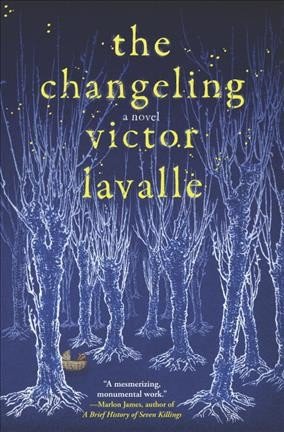The Monthly Read: You better listen to your wife!
by Mary Drake –
A review of Victor LaValle’s novel The Changeling
 If you’re confused as to what to believe nowadays with all the claims of biased information and fake news, you might not think to turn to a fairy tale for truth. But Victor LaValle, author of The Changeling, did. Although fairy tales occur in imaginary settings and have strong elements of magic, they also contain timeless elements of truth. In LaValle’s book this truth—or moral— seems to be that we should listen to others and not discount their experience.
If you’re confused as to what to believe nowadays with all the claims of biased information and fake news, you might not think to turn to a fairy tale for truth. But Victor LaValle, author of The Changeling, did. Although fairy tales occur in imaginary settings and have strong elements of magic, they also contain timeless elements of truth. In LaValle’s book this truth—or moral— seems to be that we should listen to others and not discount their experience.
In folklore, the legend of The Changeling is an old one; it’s about fairies stealing a human infant and leaving a substitute in its place. So when the book begins by announcing itself a modern-day fairy tale, you might expect it to start right away with some magic, but nothing out of the ordinary happens until one-third of the way into this four-hundred-page book. And then the narrative explodes. In chapter 30, the main character Apollo wakes to find himself chained to a kitchen chair while his wife, Emma, drives a hammer into his face and then empties a kettle of scalding water onto their infant in the next room. The last thing she says to her husband is, “It’s not a baby.”
All right, a little backstory seems in order here. The main character, Apollo, is a rare book collector; he and his librarian wife Emma have given birth to a baby boy they name Brian, after Apollo’s father who disappeared when he was four. In the months after Brian’s birth, Emma becomes increasingly depressed and is receiving anonymous pictures on her phone of their child being taken. Naturally, she’s alarmed, but whenever she tries to show them to Apollo, the pictures have disappeared. He doesn’t believe her and they become increasingly estranged. Emma tells her sister, “Sometimes I look at Brian, and I don’t think he’s my son. . . . He looks like the Brian I gave birth to, but it’s like he’s someone else. When I hold him with my eyes closed I can almost feel the difference.”
In fact, he really isn’t her baby. He’s a changeling, and Emma is the only one who can tell. The fantastical story that follows more than compensates for the ordinary way the book began. The mundane parts of the narrative are not unusual in the genre of magical realism, in which magic coexists alongside the everyday. Following the death of the supposed baby Brian, Apollo goes on a quest to find his wife, ostensibly to kill her. But in the story that follows, there are colonies of witches, conspiracies to steal babies, and trolls—both the computer kind and the mythical kind.
LaValle seems to be preoccupied with monsters, as well as the monsters we humans can become. Several of his books prior to this one concern monsters, like the comic book he wrote called The Destroyer. It’s based on Mary Shelley’s Frankenstein. In LaValle’s version, Frankenstein actively seeks to destroy human beings because he feels they have ruined everything they touch. Sometimes it’s hard to argue with that.
The Changeling was selected as one of 2017’s ten best books and won a 2018 World Fantasy Award for Best Novel. The author has taken a traditional folkloric theme and deftly interwoven it with twenty-first-century issues, such as the challenging responsibilities of modern parents, the dangers of the Internet and of computer hacking, and the importance of listening to the experiences of others, especially women. With the Brett Kavanaugh fiasco fresh in our minds, this could hardly be more relevant.
Any thoughtful reader who enjoys fantasy and fairy tales will enjoy this book. It also has a lot to say about what it means to be a good parent and a good spouse. As the book progresses, it’s impossible to predict what will happen, which is always the sign of a well written book, and, as an added bonus, you’ll get to find out what a troll really looks like. Just be patient with the beginning of the book, and soon enough you’ll be in a place you never expected.
Learn more about Victor LaValle and purchase the book at: http://www.victorlavalle.com/.
